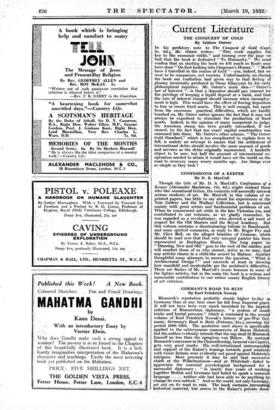Current Liteiature
THE CONQUEST OF GOLD By Isidore 'Ostrer
IN his prefatory note to The Conquest of -Gold (Cape. Ss. Od.), Mr. Ostrer writes: " This work supplies the key to the economic riddle." and turning over the page we find that the book is dedicated " To Humanity." We must confess that on starting the book we felt much as Keats may have done " On first looking into Chapman's Homer." " Much- have I travelled in the realms of Gold "—yes, indeed, but we were to be conquerors, not tourists. Unfortunately, on closing the book our exaltation had given way to that feeling of gloomy incuriosity produced in Omar Khayyam by his early philosophical inquiries. Mr. Ostrer's main idea—" Ostrer law of Interest "—is that a depositor should pay interest for the privilege of keeping a liquid deposit at a bank, and that the rate of interest charged should increase when unemploy- ment is high. This would have the effect of forcing depositors to buy or create fixed assets. This is well enough, but apart from the enormous practical difficulties, which are;hardly touched on, Mr. Ostrer rather ignores the fact thatit may not always be expedient to stimulate the production of fixed assets. Indeed, in the opinion of many competent to judge,. the American slump has been greatly intensified, if not caused, by the fact that ten years' capital construction was crammed into three. Mr. Ostrer's other scheme, " The Ostrer Gold Standard," which is too complicated to explain here in Rill, is mainly an attempt to ensure that the settlement of international debts should involve the same-amount of goods and services as the debts originally represented. A laudable object to be sure, but half the amount of international co- operation needed to attain it would have set the world on the road to recovery many weary months ago. Are things ever as'simple as they look ?






































 Previous page
Previous page